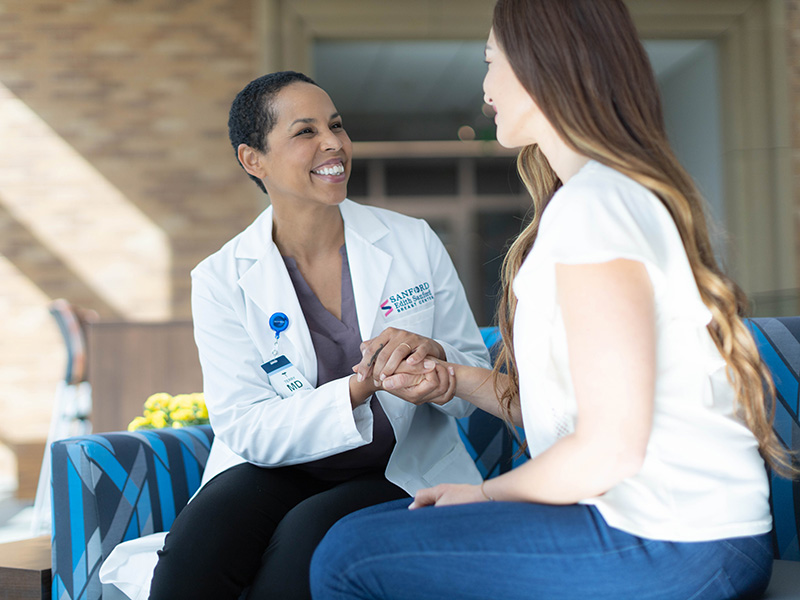Around 264,000 women are diagnosed with breast cancer every year. It’s one of the most common types of cancer in American women.
Here’s what you need to know to protect your breast health.
What is breast cancer?
Your body is growing new cells all the time. Usually, these cells die off when you don’t need them any longer. Cancer is a group of abnormal cells that mutate and grow out of control when your body doesn’t need them. They usually form a lump or mass.
Breast cancer describes any cancer that begins in the breast. It can affect both women and men, although it is rare in men. Out of every 100 breast cancers diagnosed, there is around one case found in a man.
Where does breast cancer normally begin?
The breast is made of lobules (milk glands), ducts, fat, tissue, lymph nodes and blood vessels. Cancer can start anywhere in the cells of the breast but is most likely to start in the lobules and ducts.
What causes breast cancer?
Experts don’t know exactly what causes breast cancer, but they have identified some risk factors that make you more likely to get it.
Some risk factors are things you can’t change, including:
- Sex. Breast cancer is 100 times more common in women than men.
- Age. Most women diagnosed with invasive breast cancer are older than 50. But younger women get breast cancer, too. About 10% of all new cases of breast cancer in the United States are found in women younger than 45 years of age, according to the Centers for Disease Control and Prevention.
- Genetics. Women with BRCA gene mutations are more susceptible to breast and ovarian cancers.
- Having dense breast tissue. Dense breast tissue increases your likelihood of getting breast cancer and can make it harder to spot tumors on some mammograms.
- Family history. Breast cancer can be hereditary, so you’re more likely to get it if you have a close family member with breast cancer.
Does breast cancer hurt?
Breast cancer usually isn’t painful. If you’re experiencing breast pain or discomfort, it’s more likely your menstrual cycle is the cause.
If your breast pain is severe or lasts longer than a few weeks, see your health care provider. Breast pain is rarely the main symptom of breast cancer, but it could still happen. Your provider will help you identify the cause of your breast pain and how to treat it.
What are the symptoms of breast cancer?
In early stages, breast cancer can be too small to cause symptoms. This is what makes breast cancer screenings so important. Catching breast cancer early means it’s more treatable and less likely to have spread to other parts of the body.
As breast cancer grows, it can cause changes in your breasts. Call your provider right away if you notice any of the following breast changes:
- Lump in your breast or armpit
- Change in color or shape (flatness or puckering)
- Swelling or increase in size
- Skin changes:
- Dimpling
- Pitting
- Thickness or fluid build up
- Orange peel appearance
- Skin that is red, hot, or sores that are not healing
- Inverted nipple or flattening/tugging inward of nipple
- Pain, redness, or soreness in your breast or nipple that does not go away or gets worse
- Skin of breast nipple or areola (pigmented circle around nipple) that is crusted, scaly or red
- Fluid, other than breast milk, leaking from your nipple
- A vein that has increased in size or has become more noticeable
Find a Sanford Health provider.
How can I prevent breast cancer?
There are steps you can take to help prevent breast cancer:
- Exercise regularly
- Maintain a healthy weight
- Avoid or limit alcoholic drinks
- Don’t smoke
- Breastfeed your children, if possible
- Weigh the risks of long-term use of hormone replacement therapy after menopause and oral contraceptives with your primary care provider
Having children also helps reduce your risk of getting breast cancer, especially if you have children before the age of 30.
The best way to protect your breast health is through regular screenings. Sanford Health recommends getting a mammogram every year starting at age 40. These screenings are important for detecting breast cancer early when it’s most treatable.
Depending on your risk factors, you may need to get screened earlier than age 40. Talk to your doctor to learn when you should start screenings based on your personal risk.
Medical review by Michael Bouton, M.D., a breast surgeon at the Sanford Medical Center in Fargo, North Dakota; Andrea Kaster, M.D., a family medicine physician at the Edith Sanford Breast Center Fargo in Fargo, North Dakota; and Christina Tello-Skjerseth, M.D., a radiologist at the Sanford Clinic in Bismarck, North Dakota.
Learn more
- Mammogram callbacks: Should you be worried?
- Five breast cancer screening options
- Breast cancer survivor shares her story
…
Posted In Cancer, Cancer Screenings, Women's
